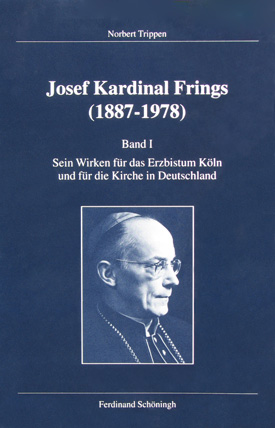Trippen, Norbert: Josef Kardinal Frings (1887–1978), Bd. 1: Sein Wirken für das Erzbistum Köln und für die Kirche in Deutschland, 2., durchges. Aufl., Paderborn [u. a.] 2003

Cardinal Frings: 25 years after his death, he remains a popular, unforgotten figure in the Rhineland, in Germany, and in the Universal Church. Cologne-based church historian Norbert Trippen has undertaken to write the definitive biography of the Cologne archbishop. This first volume of Trippen’s biography is the product of years of research and a publishing event of extraordinary significance.
Josef Cardinal Frings, born in 1887 in Neuss, lived through German history from the Wilhelmine Empire to the Federal Republic and he helped shape that history. After studying at Innsbruck, Bonn, and Cologne, and following his ordination in 1910, he served in pastoral positions for a quarter century. In 1937, during the Nazi period, he was appointed Regent of Cologne’s theological seminary and became archbishop in 1942.
As a priest in Cologne, Frings came into contact with former lord mayor and future German chancellor Konrad Adenauer. His early years as bishop, during the difficult final phase of the war and the post-war occupation, helped transform the reserved churchman into the courageous spiritual leader, for which many still remember him today. When the war ended in 1945, Frings was elected chairman of the Fulda Bishops’ Conference and promoted to cardinal in early 1946. In the years 1945–1949, he became spokesman for the beleaguered population vis a vis the occupying powers and exercised decisive influence on the formation of a new state and society.
In the 1950s, under Cardinal Frings’s leadership, Cologne emerged as a center of modern church construction, and especially of initiatives on behalf of the Universal Church. The well-known charity works Misereor and Adveniat emerged out of these initiatives, as well as the partnership between the archdioceses of Cologne and Tokyo. These Universal Church initiatives, and above all the role Cardinal Frings (with his counselor Josef Ratzinger) played at the Second Vatican Council, are treated comprehensively in the second volume of this biography.
To order our publications, please, contact your local bookshop or the publishing house Schöningh in Paderborn.
